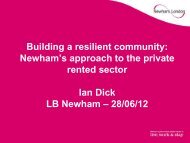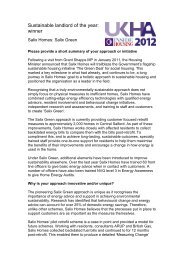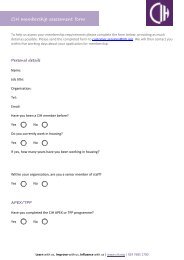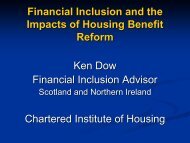View publication - Chartered Institute of Housing
View publication - Chartered Institute of Housing
View publication - Chartered Institute of Housing
Create successful ePaper yourself
Turn your PDF publications into a flip-book with our unique Google optimized e-Paper software.
PART TWO: LEADING TOMORROW<br />
Introduction to Part two – leading tomorrow<br />
By John Thornhill, Learning Officer at CIH<br />
‘Leadership and learning are indispensable to each other.’<br />
John F Kennedy<br />
Part two <strong>of</strong> this anthology considers in more detail the new skills and knowledge sets<br />
and approaches to learning which will be required by successful organisations operating<br />
in the housing industry <strong>of</strong> the future. Contributors to this anthology have identified<br />
some ‘golden threads’ which when viewed together provide a revealing depiction <strong>of</strong><br />
tomorrow’s housing pr<strong>of</strong>essional. We will consider some <strong>of</strong> these ‘golden threads’ below.<br />
Learning to learn – A consistent view emerging from this project has been that the<br />
housing pr<strong>of</strong>essional <strong>of</strong> the future will primarily need to ‘learn how to learn’; and that<br />
this engagement with learning on an on-going basis will be a defining characteristic <strong>of</strong><br />
career pathways. As work becomes more complex, with continuous change an overarching<br />
feature, individuals will be confronted with work-based scenarios they have not<br />
encountered before. Learners will need to become increasingly flexible and adaptable,<br />
more focused on finding information and solutions and skilled at applying newly<br />
acquired knowledge in different contexts. For employers, there will be a move away<br />
from rigid competency frameworks, job/task-descriptions and process driven<br />
performance management. For individuals there will be a new emphasis on agility and<br />
the ability to respond to new ways <strong>of</strong> working.<br />
‘Life in perpetual beta’ – The metaphor ‘life in perpetual beta’ is borrowed from the<br />
world <strong>of</strong> s<strong>of</strong>tware engineering, but it adequately expresses the mutability <strong>of</strong> the modern<br />
workplace. ‘Perpetual beta’ is the name given to the keeping <strong>of</strong> s<strong>of</strong>tware at the beta<br />
development stage for an extended or indefinite period <strong>of</strong> time. It is <strong>of</strong>ten used by<br />
developers when they continue to release new features that might not be fully tested.<br />
Increasingly, developers see their products as never reaching a defined end-stage <strong>of</strong><br />
development, such is the reality <strong>of</strong> constant technological change. The metaphor ‘life in<br />
perpetual beta’ refers to the way in which technology transforms the ways in which we<br />
think about ourselves as individuals and a society; but by extension it also captures the<br />
speed <strong>of</strong> change in the modern age. Individuals and organisations will have to learn to<br />
act in less planned, less process-focused ways. This will also entail both individuals and<br />
employers being open to change, embracing transferability and thinking outside <strong>of</strong><br />
traditional silos.<br />
82

















